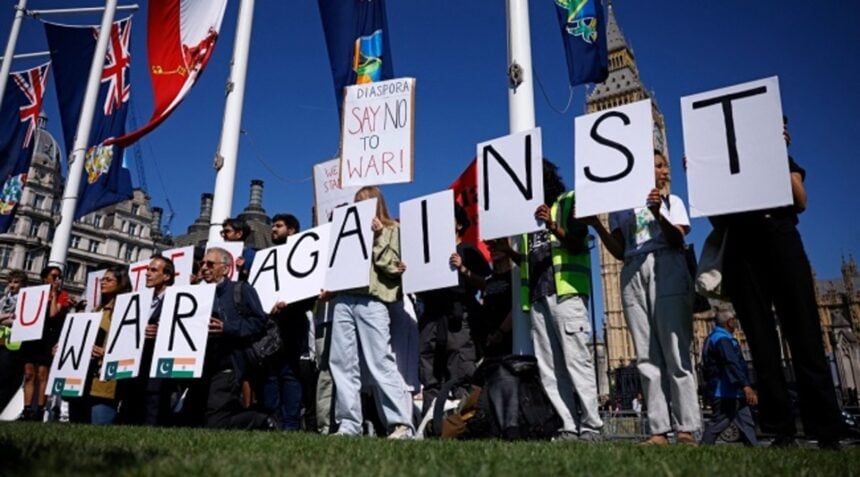A fragile ceasefire appeared to be holding on Sunday between India and Pakistan, just hours after both countries accused each other of violating the agreement that had pulled them back from the edge of full-scale war.
The truce was announced on Saturday after four days of intense cross-border violence involving fighter jets, missiles, drones, and artillery.
At least 60 people were killed and thousands displaced in what has been the worst outbreak of violence between the nuclear-armed neighbours since their last open conflict in 1999.
The unexpected “full and immediate” halt to hostilities was announced by U.S. President Donald Trump on social media, who said it followed a “long night of talks mediated by the United States.”
Trump later praised the leaders of both India and Pakistan for realizing that “it was time to stop the current aggression,” and added that the U.S. would “substantially” increase trade with both nations.
Despite the ceasefire, early Sunday saw renewed tension.
India’s foreign secretary stated that New Delhi had retaliated after Pakistan’s “repeated violations” of the truce.
Meanwhile, Pakistan declared it “remains committed” to the ceasefire and said its forces were handling Indian violations with “responsibility and restraint.”
On the ground in Indian-administered Kashmir, residents reported renewed shelling just hours after the truce was made public.
In the village of Kotmaira, Bairi Ram said his four-room house had been reduced to rubble and three of his buffaloes killed in the attack.
“Everything is finished,” he said.
In Poonch, one of the worst-hit towns during the fighting, shopkeeper Hazoor Sheikh reopened his business on Sunday.
“Finally, after days, we could sleep peacefully,” he said.
Still, analysts remained wary of the truce’s durability.
Praveen Donthi, a senior analyst with the International Crisis Group, noted, “There is a fragile peace. It’s very precarious.”
He added, “Things are going to remain hostile. Things are going to be difficult. There would be continued low-intensity attacks, probably not by the armed forces but maybe militants.”
The latest escalation began before dawn on Wednesday when India launched missile attacks against what it described as “terrorist camps” in Pakistan.
The strikes were in response to an April 22 attack on tourists in Indian-administered Kashmir that killed 26 people.
India blamed Pakistan for the attack near the town of Pahalgam, a charge Islamabad strongly denied, instead calling for an independent investigation.
Pakistan quickly responded to India’s missile strikes with heavy artillery fire and claimed to have shot down five Indian fighter jets — an assertion New Delhi has not addressed.
On Saturday, Pakistan said it had conducted its own retaliatory strikes on Indian cities.
Tensions in Kashmir have escalated since 2019, when Prime Minister Narendra Modi’s Hindu nationalist government revoked the region’s limited autonomy and brought it under direct rule from New Delhi.
Both India and Pakistan claim Kashmir in full but govern separate parts of the region, which has been a flashpoint since the subcontinent’s partition in 1947.
Despite the violence, some civilians expressed hope for lasting peace.
Bilal Shabbir, an IT consultant in Muzaffarabad, in Pakistan-administered Kashmir, welcomed the ceasefire.
“The ceasefire is a positive step,” he said. “In war, it’s not just soldiers who die, it’s mostly civilians — and in this case, it would have been the people of Kashmir.”
Pakistan Prime Minister Shehbaz Sharif, writing on X, said his country “appreciates” the U.S. intervention.
Islamabad has long advocated for international mediation in the Kashmir dispute, something India has consistently opposed.
Several countries, including Britain and Iran, as well as the United Nations, welcomed the ceasefire.
China, which borders both India and Pakistan, expressed concern over the escalation and said through state-run Xinhua that Beijing is “willing to continue playing a constructive role.”
An editorial in Dawn, Pakistan’s leading English-language newspaper, expressed cautious optimism.
“The days ahead will be critical to see whether the ceasefire holds and gives way to relative normalcy,” it said.
“While foreign friends can certainly help create a conducive atmosphere, it is Islamabad and New Delhi that will have to do the heavy lifting themselves to secure peace.”
ALSO READ TOP STORIES FROM NIGERIAN TRIBUNE






